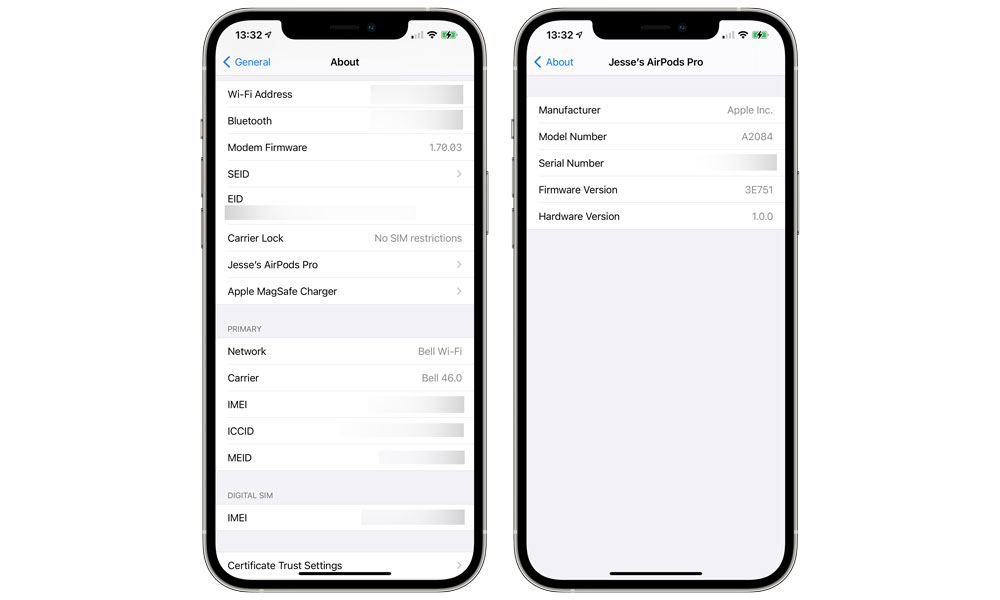Apple Quietly Releases Another AirPods Firmware Update (Here’s How to Check If You Have It)
 Credit: Fadhli Adnan / Shutterstock
Credit: Fadhli Adnan / Shutterstock
Toggle Dark Mode
In stark contrast to the fanfare that almost always comes with a new iOS release, AirPods get some of the stealthiest firmware updates that we ever see from Apple. In fact, they come to your AirPods so quietly in the background that you’re liable to miss them completely if you’re not paying attention.
Fortunately, those of us who follow the world of Apple pay attention to these things so that you don’t have to. As first noted by MacRumors, Apple has just pushed out firmware build 3E751 for both the second-generation AirPods and AirPods Pro.
This is the first AirPods update we’ve seen since 3A283 was released last fall, adding support for the new iOS 14 Spatial Audio feature on the AirPods Pro. While the second-gen AirPods didn’t gain Spatial Audio, it did get the same 3A283 build, which unified the firmware across both versions of the AirPods for the first time.
In fact, as the numbers suggested, 3A283 was a pretty significant update from what had come before, which was 2D15 for the AirPods 2 and 2D27 for the AirPods Pro.
The Era of Poor ANC
It’s unclear what changes various firmware updates have brought to the AirPods 2, but in the case of the AirPods Pro, Apple has spent quite a bit of time tweaking the sound quality and Active Noise Cancellation, although sadly not always for the better.
In fact, when the AirPods Pro originally shipped with firmware 2B584 in November 2019, they had excellent active noise cancellation. For reasons that only folks within Apple will ever know for sure, the 2B588 firmware update that came only two weeks later actually worsened the noise cancellation, leading to disappointment and complaints from many users. It was a problem that took Apple until last June to fix, when it released the aforementioned 2D27 update.
Fortunately, by the time 3A283 came out last fall, Apple had learned its lesson, and that update improved the ANC even further, while also creating an even stronger Transparency mode, thanks to support for iOS 14’s Headphone Accommodations.
Still, we can understand if you’re nervous about this newest 3E751 firmware, but we think it’s fair to say that Apple is probably through messing with a good thing.
Besides that, however, you don’t really have a choice to avoid AirPods firmware updates. Unlike most updates, where you have to opt into the upgrade process, AirPods firmware updates just happen in the background — whether you want them to or not.
Checking Your AirPods Firmware
Unless you only ever use your AirPods with a device that’s completely disconnected from the internet — which is completely unrealistic — there’s no way you’ll be able to avoid getting 3E751. You can, however, check to see which firmware version you’re running on your AirPods or AirPods Pro, just so you know for sure what you’re dealing with. Here’s how:
- Connect your AirPods or AirPods Pro to your iPhone or iPad (if they’re in the case, open the lid to wake them up).
- Open the Settings app.
- Tap General.
- Tap About.
- Scroll down to find your AirPods or AirPods Pro; when they’re connected to your device, they’ll appear at the bottom of the cellular, Wi-Fi, and Bluetooth section.
- Tap on the name of your AirPods or AirPods Pro.
- Check Firmware Version to see which version of firmware is installed on your AirPods.
Much like there’s nothing you can do to prevent an AirPods firmware update from installing, there’s also no way to force the update if you’re in a hurry to move to the newer version. The firmware updates appear to be quietly downloaded to your iPhone or iPad in the background and then applied to your AirPods the next time they’re connected. The whole process is rather opaquely managed by iOS.
Apple also doesn’t publish any release notes for AirPods firmware, so there’s no way of knowing what’s changed. We’ll be sure to keep you posted if we discover any significant changes, although it’s also possible this latest update is merely intended to address minor bugs and ensure compatibility with Apple’s new iPad Pro and 24-inch iMac models and the new 2021 Apple TV 4K.







